人教版六年级下册英语第二单元知识点
新人教版小学英语六年级下册各单元重点考点总结
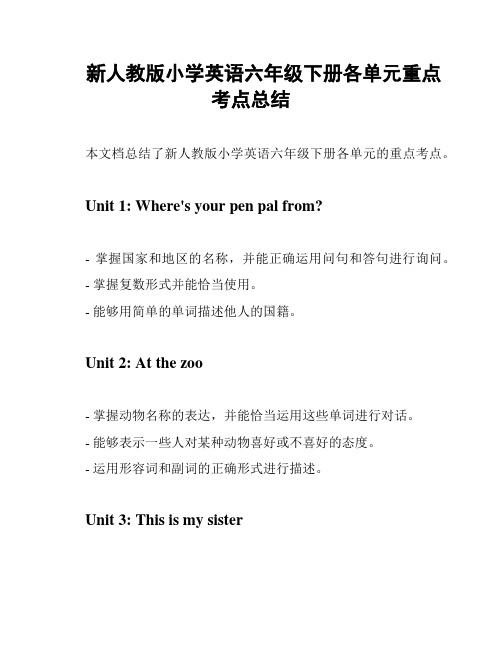
新人教版小学英语六年级下册各单元重点考点总结本文档总结了新人教版小学英语六年级下册各单元的重点考点。
Unit 1: Where's your pen pal from?- 掌握国家和地区的名称,并能正确运用问句和答句进行询问。
- 掌握复数形式并能恰当使用。
- 能够用简单的单词描述他人的国籍。
Unit 2: At the zoo- 掌握动物名称的表达,并能恰当运用这些单词进行对话。
- 能够表示一些人对某种动物喜好或不喜好的态度。
- 运用形容词和副词的正确形式进行描述。
Unit 3: This is my sister- 掌握表示家庭成员关系的词汇,并能在合适的情境下熟练使用。
- 能够用简单的句子表达自己和他人的家庭成员状况。
- 掌握疑问句和肯定/否定回答的语法结构。
Unit 4:What do you usually do on weekend?- 掌握表示日常活动和娱乐爱好的名词和动词,并能在合适的情境下熟练使用。
- 能够描述周末的计划,并能够用适当的时态表达过去、现在和未来的时间。
- 学会以礼貌的方式询问和回答他人的问题。
Unit 5: What's the matter?- 能够描述自己的身体不适,并能运用一些常用的疾病词汇。
- 掌握表示询问、建议和回答的用语,并能在合适的情境下使用。
- 学会表示关心和病愈等祝福的表达方式。
Unit 6: It's raining- 学会用简单的句子描述天气情况,并能表达对不同天气的态度。
- 掌握天气形容词的表达方式。
- 能够描述不同季节的气温、天气和风景。
总之,在学习小学英语六年级下册的过程中,应注重关注以上重点考点,并在实际中多进行运用练习,以此提高英语水平。
六年级英语下册第二单元重点知识梳理
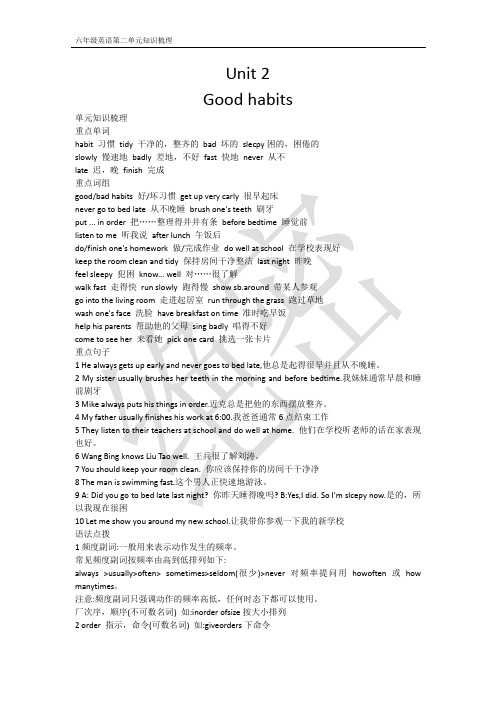
Unit 2Good habits单元知识梳理重点单词habit 习惯tidy 干净的,整齐的bad 坏的slecpy困的,困倦的slowly 慢速地badly 差地,不好fast 快地never 从不late 迟,晚finish 完成重点词组good/bad habits 好/坏习惯get up very carly 很早起床never go to bed late 从不晚睡brush one's teeth 刷牙put ... in order 把……整理得井井有条before bedtime 睡觉前listen to me 听我说after lunch 午饭后do/finish one's homework 做/完成作业do well at school 在学校表现好keep the room clean and tidy 保持房间干净整洁last night 昨晚feel sleepy 犯困know... well 对……很了解walk fast 走得快run slowly 跑得慢show sb.around 带某人参观go into the living room 走进起居室run through the grass 跑过草地wash one's face 洗脸have breakfast on time 准时吃早饭help his parents 帮助他的父母sing badly 唱得不好come to see her 来看她pick one card 挑选一张卡片重点句子1 He always gets up early and never goes to bed late,他总是起得很早并且从不晚睡。
2 My sister usually brushes her teeth in the morning and before bedtime.我妹妹通常早晨和睡前剧牙3 Mike always puts his things in order.近克总是把他的东西摆放整齐。
六年级下册英语二单元知识点归纳
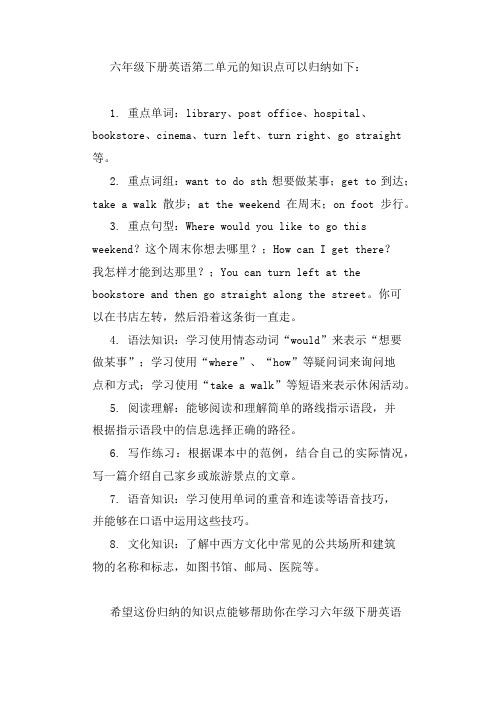
六年级下册英语第二单元的知识点可以归纳如下:
1. 重点单词:library、post office、hospital、bookstore、cinema、turn left、turn right、go straight 等。
2. 重点词组:want to do sth想要做某事;get to到达;take a walk散步;at the weekend在周末;on foot步行。
3. 重点句型:Where would you like to go this weekend?这个周末你想去哪里?;How can I get there?
我怎样才能到达那里?;You can turn left at the bookstore and then go straight along the street。
你可
以在书店左转,然后沿着这条街一直走。
4. 语法知识:学习使用情态动词“would”来表示“想要
做某事”;学习使用“where”、“how”等疑问词来询问地
点和方式;学习使用“take a walk”等短语来表示休闲活动。
5. 阅读理解:能够阅读和理解简单的路线指示语段,并
根据指示语段中的信息选择正确的路径。
6. 写作练习:根据课本中的范例,结合自己的实际情况,写一篇介绍自己家乡或旅游景点的文章。
7. 语音知识:学习使用单词的重音和连读等语音技巧,
并能够在口语中运用这些技巧。
8. 文化知识:了解中西方文化中常见的公共场所和建筑
物的名称和标志,如图书馆、邮局、医院等。
希望这份归纳的知识点能够帮助你在学习六年级下册英语
第二单元时更加轻松。
人教版英语六年级下册第二单元知识点归纳总结复习

人教版英语六年级下册第二单元知识点归纳总结复习本文旨在对人教版英语六年级下册第二单元的知识点进行归纳总结和复,以便同学们更好地掌握和运用英语知识。
一、语音单词发音:1. 内含元音字母e的单词,重读部分字母e发[i:](如w i pe,pre fer,t e n),非重读部分字母e发[ə](如op e n,nic e )。
2. 内含元音字母a的单词,底音发[æ](如c a t,a pple,b a g),有些单词在意大利语中,底音是开音[a](如p a sta)。
3. 内含元音字母o的单词,重读部分发[əʊ](如bl ow ,gr ow ),非重读部分发[ə](如ph ot o),内含元音字母o和e的单词,重读部分发[əʊ](如sh ow er),非重读部分发[ɪ](如w om e n)。
4. 指在a, o, u三个元音字母后的r的发音,在美式英语中基本不发音,而在英式英语中喜欢将发音弱化,只用[r]表示(如st a r,b o th,p u rple)。
二、语法1. 本单元主要研究there be句型, 即“有”句型。
构成方式为:there + be动词(am, is, are)+ 名词或代词。
2. 动词的第三人称单数的构成方式:一般情况下在动词后直接加s。
但以下几类动词除外:(1)以s, x, ch, sh结尾的动词,直接加es(如watch → watches,fix → fixes,pass → passes,brush → brushes)。
(2)以辅音字母+y结尾的动词,改y为i再加es(如carry → carries,study → studies)。
(3)以o结尾的动词,有的在词尾直接加s(如go → goes),有的加es(如do → does),还有的变成es(如potato → potatoes)。
三、词汇2. 这些单词需要同学们反复背诵和使用,以便记忆更加深刻。
人教版六年级下册英语第二单元知识点
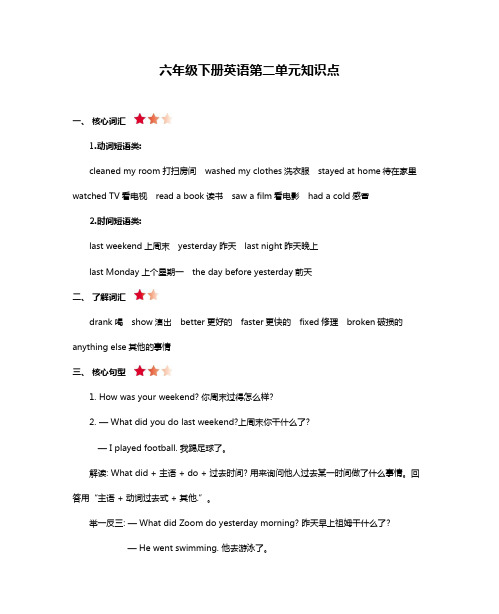
六年级下册英语第二单元知识点一、核心词汇1.动词短语类:cleaned my room 打扫房间washed my clothes洗衣服stayed at home待在家里watched TV看电视read a book读书saw a film看电影had a cold感冒2.时间短语类:last weekend上周末yesterday昨天last night昨天晚上last Monday上个星期一the day before yesterday前天二、了解词汇drank喝show演出better更好的faster更快的fixed修理broken破损的anything else其他的事情三、核心句型1. How was your weekend? 你周末过得怎么样?2. — What did you do last weekend?上周末你干什么了?— I played football. 我踢足球了。
解读: What did + 主语 + do + 过去时间? 用来询问他人过去某一时间做了什么事情。
回答用“主语 + 动词过去式 + 其他.”。
举一反三: — What did Zoom do yesterday morning? 昨天早上祖姆干什么了?— He went swimming. 他去游泳了。
— What did his parents do yesterday evening? 昨天晚上他父母干什么了?— They watched TV at home. 他们在家看电视了。
— What did your mother do last weekend? 上周末你妈妈干什么了?— She cleaned the house. 她打扫房间了。
3. — Did you read books? 你读书了吗?— Yes, I did./No, I didn't. 是的,我读了。
/不,我没读。
人教版六年级下册英语第二单元知识点
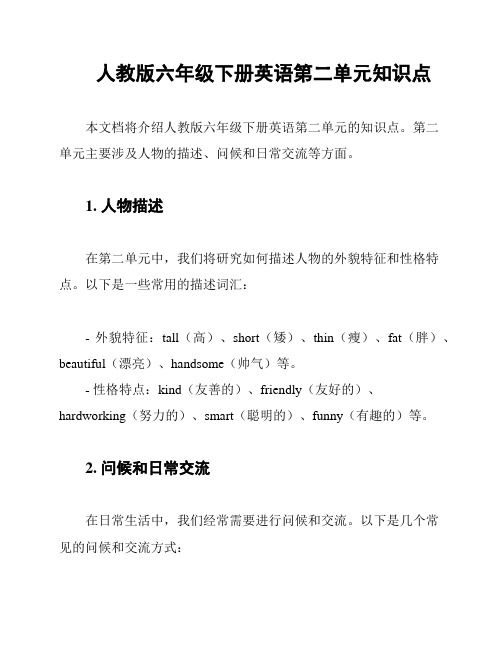
人教版六年级下册英语第二单元知识点本文档将介绍人教版六年级下册英语第二单元的知识点。
第二单元主要涉及人物的描述、问候和日常交流等方面。
1. 人物描述在第二单元中,我们将研究如何描述人物的外貌特征和性格特点。
以下是一些常用的描述词汇:- 外貌特征:tall(高)、short(矮)、thin(瘦)、fat(胖)、beautiful(漂亮)、handsome(帅气)等。
- 性格特点:kind(友善的)、friendly(友好的)、hardworking(努力的)、smart(聪明的)、funny(有趣的)等。
2. 问候和日常交流在日常生活中,我们经常需要进行问候和交流。
以下是几个常见的问候和交流方式:- 问候语:Hello!(你好!)、Good morning!(早上好!)、How are you?(你好吗?)等。
- 介绍自己:My name is...(我叫...)、I am...(我是...)等。
- 询问对方:What's your name?(你叫什么名字?)、How old are you?(你多大了?)、Where are you from?(你来自哪里?)等。
3. 相关词汇和句子接下来是一些与第二单元相关的常用词汇和句子:- 名词:student(学生)、teacher(老师)、classroom(教室)、school(学校)等。
- 动词:study(研究)、read(读)、write(写)、listen(听)等。
- 句子:I am a student.(我是学生。
)、She is my teacher.(她是我的老师。
)、Where is the classroom?(教室在哪里?)等。
总结人教版六年级下册英语第二单元主要涉及人物的描述、问候和日常交流。
通过掌握描述词汇、常用句子和问候方式,我们能够更好地与他人交流和表达自己。
希望这些知识点能帮助你更好地研究和使用英语。
以上就是本文对人教版六年级下册英语第二单元的知识点的介绍。
(完整版)人教版六年级英语下册Unit2知识点汇总
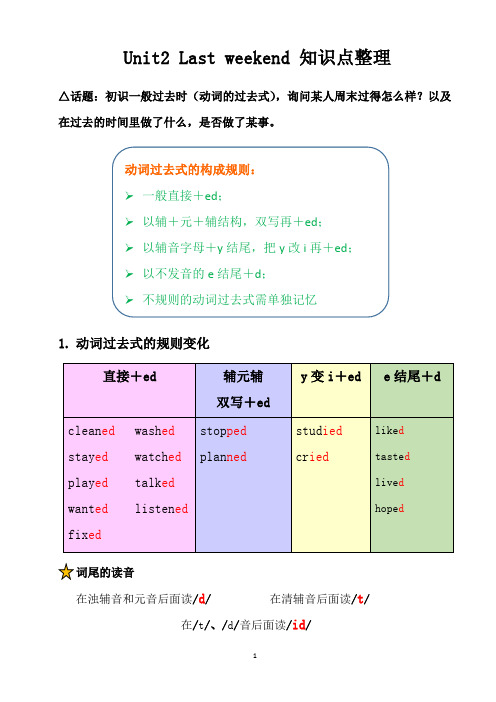
Unit2 Last weekend 知识点整理△话题:初识一般过去时(动词的过去式),询问某人周末过得怎么样?以及在过去的时间里做了什么,是否做了某事。
1.动词过去式的规则变化词尾的读音在浊辅音和元音后面读/d/ 在清辅音后面读/t/在/t/、/d/音后面读/id/2.不规则动词过去式do/does did am/is was are were have/has had see saw drink drank go went sleep slept make made get got read read3.动词短语cleaned my room washed my clothes stayed at home watched TV did my homework drank tea(喝茶) read a book saw a film(看电影) had a cold(感冒) went boating(划船) listened to music made the bed(整理床铺) 4.时间短语last night(昨晚)last Monday(上周一) last weekend(上个周末) yesterday(昨天) the day before yesterday(前天)△句型:①询问对方周末过得怎么样How was your weekend?—— It was fine/good/great,thank you.②询问某人在过去的时间里做了什么What did+主语+do(+过去时间)?——主语+动词过去式+其他。
例句:What did you do last weekend?—— I stay ed at home and watch ed TV.③询问对方在过去的时间里是否做了某事Did +主语+动词原形+其他?—— Yes,主语 did. / No, 主语 didn’t.例句:Did he have a cold yesterday?—— Yes,he did. / No,he didn’t.Did you see a film (last night)?—— Yes,I did. / No,I didn’t.④询问电影是否有趣Was it interesting?—— Yes,it was. / No, it wasn’t.△知识点:1:否定(缩写)形式:直接+not did didn’twas wasn’t were weren’t2:想要做某事:want + to +动词原形3:than+动词ing 例:It’s faster than walking.4:enjoy(享受)+动词ing I enjoy playing computer games. 5: too 用于肯定句either 用于否定句6: 句型的转换①He read a book yesterday afternoon.(对划线部分提问)What did he do yesterday afternoon ?②I washed my clothes last morning.(改为一般疑问句)Did you wash your clothes last morning?也③I went shopping last night. (改为否定句)I didn’t go shopping last weekend.④Did you do your homework last night. (否定回答)No,I didn’t.⑤My weekend was bad . (就划线部分提问)How was your weekend ?易错题❖ She usually clean s her room on the weekend.❖ She clean ed her room last weekend.❖ I like watch ing TV. I watch ed TV yesterday.❖ I am going to see a film next Friday. I saw a film last Friday. ❖ We didn’t go boating the day before yesterday.。
人教版六年级下册英语第二单元知识点
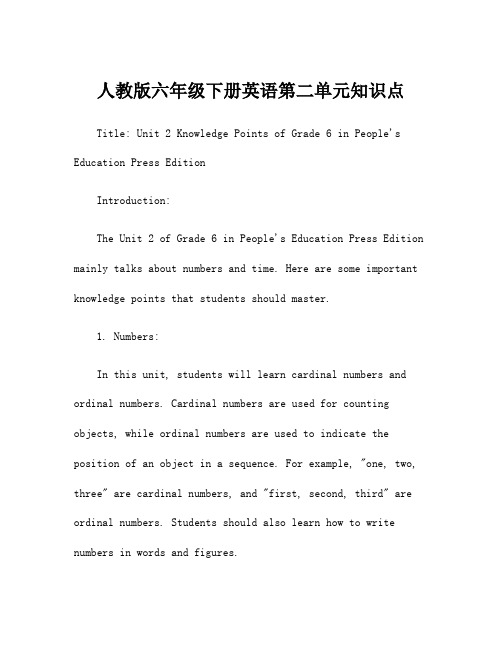
人教版六年级下册英语第二单元知识点Title: Unit 2 Knowledge Points of Grade 6 in People's Education Press EditionIntroduction:The Unit 2 of Grade 6 in People's Education Press Edition mainly talks about numbers and time. Here are some important knowledge points that students should master.1. Numbers:In this unit, students will learn cardinal numbers and ordinal numbers. Cardinal numbers are used for counting objects, while ordinal numbers are used to indicate the position of an object in a sequence. For example, "one, two, three" are cardinal numbers, and "first, second, third" are ordinal numbers. Students should also learn how to write numbers in words and figures.2. Time:In this unit, students will learn how to tell the time in both the 12-hour and 24-hour clock systems. They should also know how to use "to" and "past" to indicate the minutes, such as "it's ten to six" or "it's twenty past nine". Students should also learn the words related to time, such as "hour, minute, second, o'clock, half past, quarter to/past".3. Units of measurement:In this unit, students will learn some common units of measurement, such as centimeter, meter, kilogram, and gram. They should know how to convert one unit to another, such as how many centimeters in a meter or how many grams in a kilogram. This will help them in their future studies of science and math.4. Money:In this unit, students will learn the basic concepts of money, such as coins, bills, and currency. They should know how to count money, such as "one dollar, two dollars, fifty cents". They should also learn the currency symbols and exchange rates of some common currencies, such as US dollars, euros, and yen.Conclusion:In conclusion, the Unit 2 of Grade 6 in People's Education Press Edition covers some basic but important knowledge points about numbers and time. Mastering these knowledge points will help students build a solid foundation for future studies of science, math, and other subjects.。
- 1、下载文档前请自行甄别文档内容的完整性,平台不提供额外的编辑、内容补充、找答案等附加服务。
- 2、"仅部分预览"的文档,不可在线预览部分如存在完整性等问题,可反馈申请退款(可完整预览的文档不适用该条件!)。
- 3、如文档侵犯您的权益,请联系客服反馈,我们会尽快为您处理(人工客服工作时间:9:00-18:30)。
六年级下册英语第二单元知识点
一、核心词汇
1.动词短语类:
cleaned my room 打扫房间washed my clothes洗衣服stayed at home待在家里watched TV看电视read a book读书saw a film看电影had a cold感冒
2.时间短语类:
last weekend上周末yesterday昨天last night昨天晚上
last Monday上个星期一the day before yesterday前天
二、了解词汇
drank喝show演出better更好的faster更快的fixed修理broken破损的anything else其他的事情
三、核心句型
1. How was your weekend? 你周末过得怎么样?
2. — What did you do last weekend?上周末你干什么了?
— I played football. 我踢足球了。
解读: What did + 主语 + do + 过去时间? 用来询问他人过去某一时间做了什么事情。
回答用“主语 + 动词过去式 + 其他.”。
举一反三: — What did Zoom do yesterday morning? 昨天早上祖姆干什么了?
— He went swimming. 他去游泳了。
— What did his parents do yesterday evening? 昨天晚上他父母干什么了?
— They watched TV at home. 他们在家看电视了。
— What did your mother do last weekend? 上周末你妈妈干什么了?
— She cleaned the house. 她打扫房间了。
3. — Did you read books? 你读书了吗?
— Yes, I did./No, I didn't. 是的,我读了。
/不,我没读。
解读: Did + 主语 + 动词原形 + 其他?用来确定他人过去某个时间是否做了某事。
回答用“Yes, 主语 + did./No, 主语 + didn't.”。
举一反三: — Did Mike go fishing with you yesterday? 昨天迈克和你一起去钓鱼了吗?
— No, he didn't. 不,他没去钓鱼。
— Did they walk to the park? 他们步行去的公园吗?
— Yes, they did. 是的,他们步行去的公园。
— Did the boys have English class last weekend? 上个周末男孩们上英语课了吗?
— No, they didn't. 不,他们没上英语课。
四、了解句型
I stayed at home with your grandma. 我和你奶奶待在家里。
解读: with在这里指“和……一起”。
举一反三: Let me go with you. 让我和你一起去吧。
I did homework with Mike yesterday. 昨天我和迈克一起做作业了。
I studied English with him. 我和他一起学英语了。
当with作“和……一起”讲时,还可以用together进行替换。
如上面三个例句分别可以说: Let’s go together./Mike and I did homework together yesterday./He and I studied English together.。
